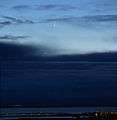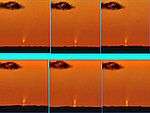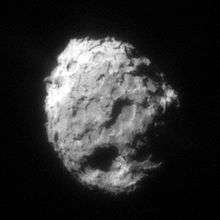C/2006 P1
 | |
| Discovery | |
|---|---|
| Discovery date | August 7, 2006 |
| Alternative designations | C/2006 P1, Comet McNaught, Great Comet of 2007 |
| Orbital characteristics A | |
| Epoch | 2454113.2961 (January 20, 2007) |
| Aphelion |
~4100 AU[a] 69,480 AU incoming |
| Perihelion |
0.17075400 AU 25,544,000 km |
| Semi-major axis |
~2050 AU[a] 34,740 AU incoming |
| Eccentricity | 1.000019[1] (Hyperbolic trajectory) |
| Orbital period |
~92,600 yr[2][a] 6,500,000 incoming |
| Inclination | 77.82768004° |
| Last perihelion | January 12, 2007[1] |
| Next perihelion | unknown |
Comet McNaught, also known as the Great Comet of 2007 and given the designation C/2006 P1, is a non-periodic comet discovered on August 7, 2006 by British-Australian astronomer Robert H. McNaught using the Uppsala Southern Schmidt Telescope.[3] It was the brightest comet in over 40 years, and was easily visible to the naked eye for observers in the Southern Hemisphere in January and February 2007.
With an estimated peak magnitude of −5.5, the comet was the second brightest since 1935.[4] Around perihelion on January 12, it was visible worldwide in broad daylight. Its tail measured an estimated 35 degrees in length at its peak.[5]
The brightness of C/2006 P1 near perihelion was enhanced by forward scattering.[6]
Discovery
McNaught discovered the comet in a CCD image on August 7, 2006 during the course of routine observations for the Siding Spring Survey, which searched for Near-Earth Objects that might represent a collision threat to Earth. The comet was discovered in Ophiuchus, shining very dimly at a magnitude of about +17. From August through November 2006, the comet was imaged and tracked as it moved through Ophiuchus and Scorpius, brightening as high as magnitude +9, still too dim to be seen with the unaided eye.[5] Then, for most of December, the comet was lost in the glare of the Sun.
Upon recovery, it became apparent that the comet was brightening very fast, reaching naked-eye visibility in early January 2007. It was visible to northern hemisphere observers, in Sagittarius and surrounding constellations, until about January 13. Perihelion was January 12 at a distance of 0.17 AU. This was close enough to the Sun to be observed by the space-based Solar and Heliospheric Observatory (SOHO).[7] The comet entered SOHO's LASCO C3 camera's field of view on January 12,[7] and was viewable on the web in near real-time. The comet left SOHO's field of view on January 16.[7] Due to its proximity to the Sun, the Northern Hemisphere ground-based viewers had a short window for viewing, and the comet could be spotted only during bright twilight.
As it reached perihelion on January 12, it became the brightest comet since Comet Ikeya-Seki in 1965.[4] The comet was dubbed the Great Comet of 2007 by Space.com.[8] On January 13 and 14, 2007, the comet attained an estimated maximum apparent magnitude of −5.5.[9]
The comet was visible in daylight about 5°–10° southeast of the Sun from January 12 to 14, with a peak brightness of magnitude −5.5.[10] Perigee (closest approach to the Earth) was January 15, 2007, at a distance of 0.82 AU.[11]
After passing the Sun, McNaught became visible in the Southern hemisphere. In Australia, according to Siding Spring Observatory at Coonabarabran, where the comet was discovered, it was to have reached its theoretical peak in brightness on Sunday January 14 just after sunset,[12] when it would have been visible for 23 minutes. On January 15 the comet was observed at Perth Observatory with an estimated apparent magnitude of −4.0.
Ulysses probe
The Ulysses spacecraft made an unexpected pass through the tail of the comet on February 3, 2007.[13] Evidence of the encounter was published in the October 1, 2007 issue of the Astrophysical Journal.[14] Ulysses flew through McNaught's ion tail 260 million kilometers (160 million miles) from the comet's core and instrument readings showed that there was "complex chemistry" in the region.
The Solar Wind Ion Composition Spectrometer (SWICS) aboard Ulysses measured the composition of the comet tail and detected unexpected ions within the comet's tail. It was the first time that researchers detected O3+ oxygen ions (atoms of oxygen with a positive charge because they have five electrons instead of eight) near a comet. This suggested that the solar wind ions, originally missing most of their electrons, picked up some of their missing electrons as they passed through McNaught's atmosphere.
SWICS also measured the speed of the solar wind, and found that even at 260 million kilometers (160 million miles) from the comet's nucleus, the tail had slowed the solar wind to half its normal speed. The solar wind should usually be about 700 kilometres (435 mi) per second at that distance from the Sun, but inside the comet's ion tail, it was less than 400 kilometres (250 mi) per second.
"This was very surprising to me. Way past the orbit of Mars, the solar wind felt the disturbance of this little comet. It will be a serious challenge for us theoreticians and computer modellers to figure out the physics,"
—space science professor, Michael Combi.[13]
Prof. George Gloeckler, the principal investigator on the Solar Wind Ion Composition Spectrometer (SWICS), said the discovery was important as the composition of comets told them about conditions approximately 4.5 billion years ago when the Solar System was formed.
"Here we got a direct sample of this ancient material which gives us the best information on cometary composition. We're still in the process of figuring out what it tells us. We're contributing part of the whole puzzle".
"The benefits of such an observation are important. They constrain the interactions of such comets with the Sun, including how the comets lose mass. They also examine the question of how a sudden injection of neutral and cold material interacts with hot solar-like plasmas. That occurs in other places of the universe and we were able to study it right here,"
—space science professor, Thomas Zurbuchen.[13]
Period
Comet C/2006 P1 follows a hyperbolic trajectory (with an osculating eccentricity larger than 1)[1] during its passage through the inner Solar System, but the eccentricity will drop below 1 after it leaves the influence of the planets and it will remain bound to the Solar System as an Oort cloud comet.
Given the orbital eccentricity of this object, different epochs can generate quite different heliocentric unperturbed two-body best-fit solutions to the aphelion distance (maximum distance) of this object.[b] For objects at such high eccentricity, the Sun's barycentric coordinates are more stable than heliocentric coordinates. Using JPL Horizons, the barycentric orbital elements for epoch 2029 generate a semi-major axis of 2050 AU and a period of approximately 92,600 years.
Image gallery
- Images of Comet McNaught in January 2007
 Over Iceland on January 9
Over Iceland on January 9 Just after sunset from Perth, Western Australia on January 16
Just after sunset from Perth, Western Australia on January 16 Over Perth, Western Australia at 9 p.m. on January 17
Over Perth, Western Australia at 9 p.m. on January 17 Seen from South Beach, Fremantle, Western Australia on January 17. The lights at the bottom are navigation lights in Gage Roads.
Seen from South Beach, Fremantle, Western Australia on January 17. The lights at the bottom are navigation lights in Gage Roads..jpg)
 January 18 from Pukekohe, New Zealand
January 18 from Pukekohe, New Zealand- January 19 from La Perouse, Sydney, Australia
 From Signal Hill, Cape Town on January 19. The silhouette of Lion's Head is visible on the left, while on the right Venus sets over the Atlantic Ocean.
From Signal Hill, Cape Town on January 19. The silhouette of Lion's Head is visible on the left, while on the right Venus sets over the Atlantic Ocean. 20 January from Lawlers, Western Australia
20 January from Lawlers, Western Australia Villa Alemana Region of Valparaiso, Chile on January 20
Villa Alemana Region of Valparaiso, Chile on January 20 from Red Hill, Canberra on January 21
from Red Hill, Canberra on January 21 Comet McNaught in broad daylight while it was visible by naked eye. Taken on January 13 at 14:00 UTC in Gais, Switzerland.
Comet McNaught in broad daylight while it was visible by naked eye. Taken on January 13 at 14:00 UTC in Gais, Switzerland. The tail of the comet Comet McNaught was still seen in the Northern hemisphere after the comet itself was long gone. The picture also shows the Moon and Venus.
The tail of the comet Comet McNaught was still seen in the Northern hemisphere after the comet itself was long gone. The picture also shows the Moon and Venus. A very rare sequence of the inferior Mirage of the comet set
A very rare sequence of the inferior Mirage of the comet set
Notes
- ^ Solution using the Solar System Barycenter
- ^ Read osculating orbit for more details about heliocentric unperturbed two-body solutions
References
- 1 2 3 "JPL Small-Body Database Browser: C/2006 P1 (McNaught)" (2007-07-11 last obs.). Retrieved 2009-12-17.
- ↑ "Comet C/2006 P1 (McNaught) - facts and figures". Perth Observatory in Australia. 2007-01-22. Retrieved 2011-02-01.
- ↑ "Report on the comet discovery and progress from Robert McNaught's homepage". Retrieved 2007-01-17.
- 1 2 "Brightest comets seen since 1935". Harvard. Archived from the original on 2011-12-28. Retrieved 2007-01-12.
- 1 2 "Kronk's Cometography — C/2006 P1". Retrieved 2010-01-21.
- ↑ Marcus, Joseph N. (October 2007). "Forward-Scattering Enhancement of Comet Brightness. II. The Light Curve of C/2006 P1" (PDF). International Comet Quarterly. pp. 119–130.
- 1 2 3 "Brightest Comet in Over Forty Years". SOHO (Hot Shots). 4 Feb 2007. Retrieved 2011-04-18.
- ↑ The Great Comet of 2007: Watch it on the Web Yahoo News, January by Joe Rao of SPACE.com Skywatching Columnist. Accessed January 16, 2007
- ↑ "C/2006 P1 ( McNaught )".
- ↑ "Untitled Document".
- ↑ "Southern Comets Homepage". Retrieved 2007-01-17.
- ↑ "C/2006 P1 (McNaught)".
- 1 2 3 "A chance encounter with a comet". Astronomy. October 2, 2007.
- ↑ Neugebauer; et al. (2007). "Encounter of the Ulysses Spacecraft with the Ion Tail of Comet MCNaught". The Astrophysical Journal. 667 (2): 1262–1266. Bibcode:2007ApJ...667.1262N. doi:10.1086/521019.
External links
| Wikimedia Commons has media related to Comet McNaught. |
- McNaught, Robert (2007). "C/2006 P1". Siding Spring Observatory. Australian National University. Retrieved 2007-01-21.
- C/2006 P1 at Cometary Science Center
- Info and gallery, from skytonight
- Comet McNaught in Perth skies
- C/2006 P1 at the JPL Small-Body Database

- Current hotshots of comet, from NASA's Solar and Heliospheric Observatory website
- Animation of recent images within LASCO C3's FOV
- McNaught in STEREO HI1a
- Montage McNaught in STEREO HI1a
- Comet McNaught photo gallery from Southern Hemisphere
- NASA Astronomy Pictures of the Day:
- January 5 - Comet McNaught Heads for the Sun
- January 9 - McNaught Now Brightest Comet in Decades
- January 13 - Comet Over Krakow
- January 15 - Comet McNaught Over Catalonia
- January 17 - Comet McNaught from New STEREO Satellite
- January 18 - Southern Comet
- January 19 - McNaught's Matinee
- January 20 - SOHO: Comet McNaught Movie
- January 22 - The Magnificent Tail of Comet McNaught
- January 24 - A Comet Tail Horizon
- February 1 - A Tail of Two Hemispheres
- February 5 - Comet Between Fireworks and Lightning
- February 12 - Comet McNaught Over New Zealand

